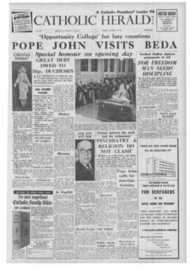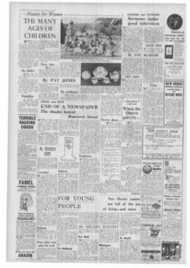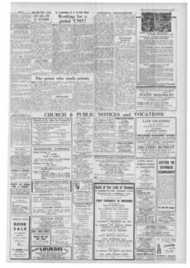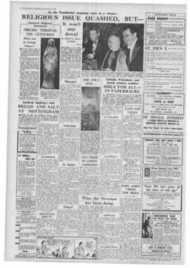Page 6, 28th October 1960
Page 6

Report an error
Noticed an error on this page?If you've noticed an error in this article please click here to report it.
Tags
Share
Related articles
Cross And Keys
In A Few Words
The Football Of Fortune
The Strange Story Of Francis Thompson
Society's `greatest Shame'
END OF A NEWSPAPER
The shades haunt Bouverie Street
By FRANCIS
KENT
SHADES of many men, great in their various ways, seemed to haunt Bouverie
Street last week to look in sorrow (and, perhaps, anger) at the wreck of two newspapers with distinguished traditions and history.
Charles Dickens, T. P. O'Connor, Robert Lynd, H. M. Tomlinson, A. G. Gardiner, G. K. Chesterton, Hilaire Belloc, tan Mackay — each in his time made the English language ring in the columns of the "Daily News" (later the "News Chronicle") and the "Star", now as dead as they.
Sir Philip Gibbs, himself an old hand on the "Daily Chronicle", wrote once and for all in "The Street of Adventure" the story of the end of a newspaper — the ill-fated "Tribune". It is not greatly different today, except that there is more flotsam and jetsam after the wreck in the Fleet Street that covers the waters of the Fleet river.
Loyalties
M. TOMLINSON would • probably have written about a newspaper's end as if describing a shipwreck. There was a touch of Conrad in him. He had served the old "Daily News", and I have heard him quoted as saying that it "had the best staff of any paper in Fleet Street hut did not know how to use its men" — a thing that has been said many times since. Latterly it might have been thought that the "News Chronicle" had the most loyal readers of any Fleet Street newspaper but did not seem to know how to serve them.
The "News Chronicle" had in turn taken over the "Westminster Gaze tt e" and the "Daily Chronicle" and, more recently, Manchester's "Daily Dispatch". That famous cartoonist David Low once depicted Henry Cadbury as the skipper of a pirate ship. bestriding the bones of the other newspapers. But these were somehow different from the absorption of the "News Chronicle" and "Star" by the "Daily Mail" and "Evening News". Something of its old spirit lived on while the editor of the defunct "Westminster", J. A. Spender, contributed his "People and Politics" to what was for a short while the "News and Westminster "; the "News Chronicle" took on the better part of the old "Chronicle". its sports service,
Dickens
THERE seemed something a little bogus about the Charles Dickens legend, so carefully preserved, because he was its first editor for less than a month after founding the paper in 1846. But, when he resigned, "worn out" after three weeks, he left behind (as well as his father as news editor and his uncle of chief subeditor) a zeal for reform and the social conscience which remained its inspiration for more than a hundred years. It is these which are lost with the newspaper's death.
At times during the past week it appeared, to those who watched the cynical scramble by the "popular" dailies for the circula tion of the dead morning and evening newspapers, that the last shred of decency had been flung to the winds in the battle of the grab between the "big brothers" who dispute the field.
Editors
T HAVE KNOWN nine editors • of the "Daily News" and its
successor, and several of the "Star" including T. P. O'Connor, its founder.
There was A. G. Gardiner whose pungent profiles of contemporary personalities appeared each Saturday and were later collected in books over his pen-name. "Alpha of the Plough". Stuart Hodgson, with his pipe, his charm, wingcollar, and pince-nez, often carried a Greek New Testament, "Alice in Wonderland" and a Blue Book under his arm when he came in at three o'clock to write his leader. Hugh Jones, who had once sold newspapers in the streets of Manchester and initiated the Wireless for Hospitals fund when broadcasting was in its infancy, used to say that when he heard me talking in the next room he always thought it was A. G. Gardiner (just as Fr. Joseph Christie says I could mount the pulpit at Chelsea's church of the Holy Redeemer, and get away with it if the congregation were blind!). There were Tom Clarke, who used a Northcliffe flair to give the paper its first million circulation; Aylmer Valiance. clever left-wing economist; and Sir Gerald Barry. to whom must go the credit for having foreseen more clearly than most the growing menace of Hitler. R. J. Cruikshank. once a lanky youth in the reporters' room with a gift for a phrase. wrote the paper's centenary history in "Roaring Century" in 1946.
Endpieces
THAT there was still plenty of fight in the "News Chronicle's" journalists is seen by the activities of the Action Committee formed by its displaced staff. There has been both tragedy and comedy in the past week.
'Ehe bust of Dickens disappeared mysteriously from its accustomed plinth in the office entrance: its discovery (in a most unlikely place) was almost the last task of the office detective.
I heard that an unfortunate "Daily Mail" sub-editor was due to begin working on the "News Chronicle' on the very afternoon the announcement was made that the paper would not come out next day.
And I met an office boy smoking a sad cigarette in a corridor.
lamenting the paper's end. He had been there a week. but assured me he was all right: "I draw two weeks' compensation money and join the 'Guardian' on Monday!"
blog comments powered by Disqus









